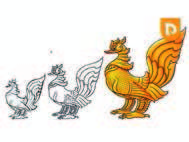By AUGUSTIN
PROVERBS and expressions are really important in everyday conversation. They give us a peek into different cultures and make language more interesting. They help us create strong connections with others and make conversations stick in our minds.
မကောင်းသူကို ပယ် ကောင်းသူကို ကယ်
Celestial beings and great kings tend to protect the good people and reject the immoral people. It also means we should stay away from the immoral people, and save the good when opportunity arises.
မကောင်းသူကို ပယ်၊ ကောင်းသူကို ကယ် သည် မြန်မာ ဆိုရိုးစကား ဖြစ်သည်။
နတ်ကောင်းနတ်မြတ်များ၊ မင်းကောင်းမင်းမြတ်များသည် မ ကောင်းသောသူ များကို ဖယ် ရှားပစ် ပြီး ကောင်းမြတ် သောသူ များ ကို ကယ်တင်စောင့်ရှောက်မည်ဟု ဆိုလိုသည်။ ဤဆိုရိုးစကား သည် ကောင်းမှုနှင့် မကောင်းမှု၊ တရားမျှတမှုနှင့် ပတ်သက် သော အယူအဆကို ဖော်ပြသည်။ ကောင်းသောသူများသည် အကာအကွယ်နှင့် ထိုက်တန်ပြီး မကောင်းသောသူများသည် အပြစ်ဒဏ်ခံထိုက်သည်ဟု ယုံကြည်ကြသည်။ ဤဆိုရိုးစကား သည ်အု ပ် ချုပ် သူ များအနေဖြင့် လည်း မကောင်းသူ များကိုဖယ် ရှား ပြီး ကောင်းသောသူ များကိုချီးမြှောက် သင့် ကြောင်းကိုသွ ယ် ဝို က် ၍သွန်သင်သည်။
“Reject the wicked, save the virtuous” is a saying from Myanmar.
This saying means that good people and good leaders should get rid of bad people and protect the good ones. It talks about the ideas of right and wrong, fairness, and justice. People believe that those who are good should be kept safe, while those who are bad should be punished. It also teaches that leaders should help the good and stop the bad from causing trouble.
USAGES:
To separate the wheat from the chaff.
Definition: To distinguish what is valuable or useful from what is worthless or bad.
Example Sentence: The new manager’s first task was to separate the wheat from the chaff in the underperforming department and build a strong core team.
To throw out the baby with the bathwater.
Definition: To discard something valuable along with something worthless when trying to get rid of the latter.
Example Sentence: In their eagerness to reform the corrupt system, they need to be careful not to throw out the baby with the bathwater and lose the genuinely beneficial aspects.
To stand up for what is right.
Definition: To defend moral principles or good people against injustice or wrongdoing.
Example Sentence: The community leader was known for always standing up for what is right, protecting the vulnerable and challenging corruption.
ဇာတ်တူသားစား၍ ဟင်္သာကိုးသောင်းပျက်
The Myanmar saying talks about how bad it is when people in a group are not loyal to each other. When someone betrays their friends, trust goes away, and the group stops working well together. This fighting inside the group makes them weak and can cause them to fail, especially when outside dangers come along.
ဟင်္သာ = Brahminy duck ( Pali ဟံသ)
ဟင်္သာအချင်းချင်း ပြန်စား၍ ဟင်္သာကိုးသောင်းပျက်စီး သကဲ့သို့ မိမိတို့အချင်းချင်းသစ္စာမဲ့၍ အားလုံးပျက်စီးရသည်။
“ရှေးဝယ်မယွင်း၊ မင်းပေါရိသာဒ်၊ ဗြဟ္မဒတ်ရာဇာ၊ အာနန္ဒာ နှင့်၊ ဟင်္သာကိုးသောင်း၊ ထိုအပေါင်းတို့၊ တိမ်းစောင်းတရား၊ .. ဇာတ်တူသားကို၊ စား၍မုချ၊ ပျက်စီးကြ၏။” [၁၂၆၆] မဃ * ၁၇၆။ “ဇာတ်တူသားစား ဟင်္သာကိုးသောင်းပျက် ဟူသော ထုံးကို မျှ သတိမူမိကြပုံမရ၊ ရွာသားအချင်းချင်းပင် သတ်ချင်လျှင် သတ် ကြသည်။” [၁၃၂၉] ရှေ့သို့၊ ၁၂၊ ၄။ ၂၂။
ရှေးအခါကစိတ္တကုဋ်တောင် ရွှေဂူကြီးတစ်ခုအတွင်းတွင် ဟင်္သာကိုးသောင်းတို့ ... ခိုအောင်းနေထိုင်ကြသည်။ မိုးကာလ တွင် အပြင်သို့မထွက်ဘဲ နွေအခါကသိုမှီးထားသည့် အစားအစာ များကို စား၍နေထိုင်ကြသည်။ ထိုအခါ လှည်းဘီးခန့်ရှိသော ပင့်ကူကြီးတစ်ကောင်သည် ဂူဝတွင် အမြှေးကွန်ရက် ဖွဲ့၍နေ၏။ ဟင်္သာတို့သည် ထိုကွန်ရက်ကို ဖောက်ရန် သန်စွမ်းသော ဟင်္သာ ပျိ ုတစ်ကောင်အား အစာကို နှစ်ဆ ကျွေးထား၏။ မိုးစဲသော် ဟင်္သာပျိ ုဦးဆောင် သော ဟင်္သာများသည ် ပင့် ကူ မြှေးကိ ု ဖောက် ထွက်၍ သွားကြ၏။ တစ်ခါသော် ငါးလပတ်လုံး မိုးရွာ၏။ ဟင်္သာ တ ို့အစာကု န် သော ် ... အချင်းချင်း တို င် ပင် ၍ဦးစွာ ဟင်္သာဥတို့ ကို စားကြ၏။ နောက် မှဟင်္သာငယ် တို့ ကိုလည်းကောင်း၊ ဟင်္သာအို တို့ ကိုလည်းကောင်း စားကြ၏။ ငါးလလွန်၍ မိုးစဲသော် ပင့်ကူသည် အမြှေးကွ န် ရက်ငါးခု ဖွဲ့ပြီး၏။ ဟင်္သာတို့ သည ်မိ မိ တို့ဇာတ် တူ သား ကို စားကြသဖြင့် ခွန်အားနည်းလေ၏။ အစာနှစ်ဆစားရသော ဟင်္သာပျိုဦးဆောင်၍ ပင့်ကူမြှေးကို ရှေးနည်းတူဖောက်ရာ ငါးခု မြောက်သော ပင့်ကူကွန်ရက်၌ ငြိ၍ အသက်ဆုံးကြရ၏။ ဤသို့ ဖြင့် ဟင်္သာကိုးသောင်း ပျက်စီးရသည်။
ခုဒ္ဒကနိကာယ်၊ ၅၃၇-မဟာသုတသောမဇာတ်။
A long time ago, on Mount Cittakūṭa, there were ninety thousand hinthas (Brahminy ducks) living in a big golden cave. They stayed inside during the rainy season and ate the food they had saved up in the summer.
One day, a huge spider, as big as a cartwheel, made a thick web at the entrance of the cave. The hinthas decided to feed a strong young hintha extra food so it could break through the web. When the rain finally stopped, the hinthas, led by the young hintha, broke through the spider’s web and went outside.
But it rained for five whole months, and they ran out of food. At first, they ate the hintha eggs, and then they started eating the young hinthas and even the old hinthas. After five months, the spider had made five layers of web. Because they had eaten their own kind, the hinthas became weak.
When the young hintha, who had been fed extra food, led them to break through the web again, they got stuck in the fifth layer and died. In the end, all ninety thousand hinthas perished because of their betrayal.
USAGES:
A house divided against itself cannot stand.
Definition: A group or organization that is internally conflicted or disunited will not be able to survive or succeed.
Example Sentence: The company’s constant infighting over strategy meant that, like a house divided against itself, it eventually lost its market share to more unified competitors.
To stab someone in the back.
Definition: To betray someone who trusts you.
Example Sentence: He thought they were allies, but when he was passed over for the promotion, he realized his colleague had stabbed him in the back by spreading rumours.
To wash your dirty linen in public.
Definition: To discuss private disagreements or embarrassing matters in front of other people.
Example Sentence: The team’s public arguments about their roles were like washing their dirty linen in public, damaging their reputation and morale.
To rock the boat.
Definition: To do or say something that upsets a stable situation or causes problems.
Example Sentence: Even though he disagreed with the new policy, he decided not to rock the boat because the team was already under a lot of pressure.
To fall foul of each other.
Definition: To quarrel or come into conflict with each other.
Example Sentence: The explorers, once a cohesive unit, began to fall foul of each other due to the harsh conditions and dwindling supplies.
To have a snake in the grass.
Definition: To have a secret enemy or someone who is treacherous within a group.
Example Sentence: The political campaign suffered greatly when they discovered they had a snake in the grass leaking confidential information to the opposition.
ထောပတ်ကောင်း စလောင်းနှင့်တည်
ကော င်း မွ န် သော ထော ပ တ်ကို စ လော င်း နှ င့်ထည့် ၍ တည်ခင်းကျွေးမွေးစေကာမူ ထောပတ်၏ ကောင်းမွန်သော အရသာ ပျက်မသွားသကဲ့သို့ အရည်အချင်း ရှိသူသည် မည်သည့် နေရာသို့ ပင ် ရောက် ရောက် မိ မိ ၏အရည် အချင်း ယု တ်လျော့ သွား မည် မဟုတ်ချေ။
“သုံးလုံးတစ်ပိုဒ်၊ လေးလုံးတစ်ပိုဒ်ရှိသော ပိုဒ်တွင်းတစ်လုံး ကျော်ကာရန်ပါသည့် စကားပုံကို ထုတ်ပြပါမည် ... ထောပတ် ကောင်း စလောင်းနှင့် ထည့် .. ” [၁၃၄၈] မြတ်လေး၊ ၄။ ၂၆။
စလောင်း = an earthenware lid for an earthenware cooking pot = clay pot lid
Good butter served in a clay pot:
Just like the yummy taste of good butter stays the same even if it’s put in a clay pot and served, a talented person’s skills and qualities won’t change no matter where they are.
This is a Myanmar proverb that uses the analogy of good butter retaining its quality even when cooked and served in a simple clay pot to illustrate that a person’s inherent talents and abilities will remain intact regardless of their circumstances or surroundings.
USAGES:
Cream always rises to the top.
Definition: The best people or things will eventually become successful or prominent, no matter what their initial circumstances.
Example Sentence: Despite starting in a small role, her exceptional talent for leadership meant that cream always rises to the top, and she was soon promoted to CEO.
A good tree brings forth good fruit.
Definition: A person with good character or inherent qualities will naturally produce good results or actions.
Example Sentence: He was raised with strong values, and like a good tree bringing forth good fruit, his honesty and integrity were evident in all his dealings.
You can’t keep a good man down.
Definition: A capable and determined person will always overcome difficulties and succeed in the end.
Example Sentence: Despite facing numerous setbacks in his career, you can’t keep a good man down, and he eventually achieved his lifelong ambition.
Talent will out.
Definition: Natural ability or skill will eventually become apparent or recognized, no matter the circumstances.
Example Sentence: She worked quietly in the background for years, but her exceptional artistic talent eventually out, leading to widespread acclaim.
A leopard can’t change its spots.
Definition: A person’s fundamental nature or character will not change, even if they try to behave differently. (While this can sometimes have a negative connotation, it also implies that inherent qualities are persistent).
Example Sentence: Despite his attempts to appear humble, his underlying arrogance kept showing through; it’s true what they say, a leopard can’t change its spots.
Good blood will tell.
Definition: Inherited qualities, especially good ones, will eventually become apparent.
Example Sentence: Coming from a family of renowned scientists, it was no surprise that her aptitude for research was exceptional; good blood will tell.



